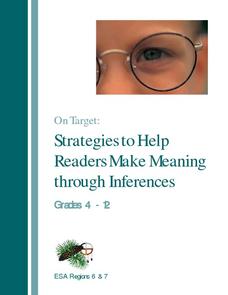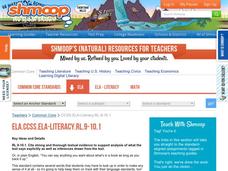Curated OER
On Target: Strategies to Help Readers Make Meaning through Inferences
Here's a resource that explicitly teaches, models, and provides readers with opportunities to practice the process of drawing inferences from text. Packed with strategies elementary, middle, and high school teachers can use, the resource...
K12 Reader
What Can You Infer?
Perhaps one of the most famous and illustrative stories featuring irony, "The Gift of the Magi" by O. Henry provides many opportunities for learners to make inferences about its characters. After reading a short introductory passage from...
Teacher Web
Inferring Character Traits
Learning how to draw inferences from text is a key reading comprehension skill. Here's a worksheet that gives readers a chance to practice by offering 20 descriptive sentences and asking kids to identify the inferred character trait, and...
Curated OER
"All Summer in a Day" by Ray Bradbury
After reading "All Summer in a Day," by Ray Bradbury, have your learners respond to these questions. The worksheet starts out with comprehension questions and moves into higher-level inference and judgment questions. This could be used...
Curated OER
"Monsters Are Due on Maple Street" by Rod Serling
These questions ask learners to think about the text "Monsters Are Due on Maple Street" in a variety of ways. In addition to practicing reading comprehension, class members work on interpreting, making inferences and connections,...
Curated OER
Comprehension Questions: The City of Ember, Chapter 20
Comprehension questions for the last chapter of Jeanne DuPrau's book The City of Ember assess factual recall, sequencing skills, and inference about the text. Note: One question about point of view is based on a sentence not related to...
Curated OER
To Kill a Mockingbird: End of Novel Critical-Thinking Questions
Chapters 28 – 31 of Harper Lee’s To Kill a Mockingbird are the focus of a series of critical thinking questions. Responders are encouraged to refer directly to the novel to support their inferences and interpretations.
Great Books Foundation
The Glass of Milk
It's not easy to ask for help. Learn why a boy on a ship struggles with accepting help in "The Glass of Milk," a short story by Manuel Rojas. Six discussion questions prompt class members to make inferences from the text about character...
K12 Reader
Setting the Scene: Great Expectations
Expect great things from this reading comprehension exercise that asks readers to cite evidence from the provided passages of Great Expectations to support the inference that Charles Dickens' Miss Havisham, and her room, are indeed strange.
Polk Bros Foundation
I Can Analyze Cause and Effect
Examine cause and effect by asking pupils to fill out a basic graphic organizer. The template is for any story or event and provides a line for writing in the story or event title. Pupils write in two causes in the circles and the change...
Great Books Foundation
On the Origin of Species
How did Charles Darwin support his controversial theory of evolution with evidence? Use an excerpt from his 1859 work On the Origin of Species to reinforce the importance of making inferences within an informational text, and to discuss...
Curated OER
Three Level Questions: Parrot in the Oven
Helpful for any reading comprehension lesson, this worksheet focuses on Victor Martinez's Parrot in the Oven. It contains three levels of questions: Right There (comprehension-level questions), Think and Search (questions you need to...
Curated OER
Taming of the Shrew, Act 4.3, Study Questions
Shakespeare can be a challenge to the most skilled high school readers. This selection of short answer questions helps increase understanding of the character, Katherine, by addressing dialogue, tone of voice, making inferences, and...
Curated OER
"The False Gems" by Guy de Maupassant
Readers must go beyond the surface level of Guy de Maupassant's story, "The False Gems," to answer the questions on this worksheet. They must draw inferences, evaluate character's actions, and analyze how irony and symbolism give depth...
Curated OER
To Kill a Mockingbird Study Guide Part II
Focus your class's reading of To Kill a Mockingbird with this resource. Eighty-three questions are provided for chapters 12-31, the majority of which focus on plot recall. Since this is a word document, you can consider adding questions...
Prestwick House
The House on Mango Street Activity Pack
Enrich a unit on The House on Mango Street by Sandra Cisneros with a selection of related activities. The packet contains nine activities that go from pre-reading through wrapping up the novel. Young readers work on studying author's...
Curated OER
Tools of Persuasion
Ethos, pathos, and logos. After reading a passage about Aristotle's, three basic tools of persuasion, individuals answer a series of multiple choice comprehension questions and craft responses to three short-answer essay prompts.
PBS
Does Art Imitate Life?
Write what you know, sound advice for any writer and something many famous authors are known to have done. Use these materials to explore how Shakespeare's life influenced his plays. This resource is packed with readings, video segments,...
IPDAE
Themes in Short Stories
"What is the theme of this story?" The very question can spark fear in the minds of readers and incinerate confidence. Here you will discover an exercise that shows how writers use the tools of setting, plot, conflict, and...
Shmoop
ELA.CCSS.ELA-Literacy.RL.9-10.1
Does your ELA class need some practice with the specific skills outlined in the Common Core standards? Then this is the perfect resource for you! One in a series of connected lessons that cover the standards for reading literature,...
California Education Partners
Gettysburg Address
Looking for an assessment that reveals how well readers understand complex text? Check out an assessment module based on "The Gettysburg Address." Pupils are asked to craft an essay that demonstrates their understanding not only of the...
California Education Partners
Letter From Birmingham Jail
To demonstrate their ability to comprehend complex text, ninth graders are asked to craft an essay in which they use evidence drawn from "Letter From Birmingham Jail" to analyze how Martin Luther King, Jr. uses rhetorical devices such as...
California Education Partners
Glass Menagerie
As a reading comprehension assessment, ninth graders are asked to use evidence drawn from The Glass Menagerie to support an analysis of how Tennessee Williams uses specific lines to develop Amanda's character as well as her relationships...
California Education Partners
Hope Despair Memory
Elie Wiesel's "Hope, Despair and Memory" provides ninth graders an opportunity to demonstrate their ability to analyze complex text. Individuals craft an essay that draws evidence from the text of the speech to show how Wiesel develops...

























